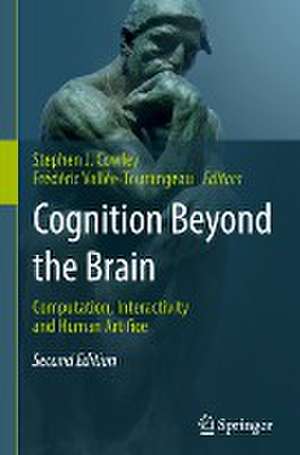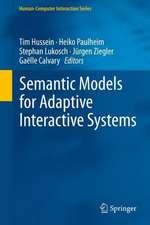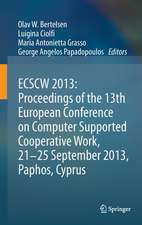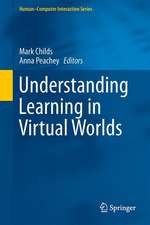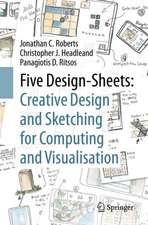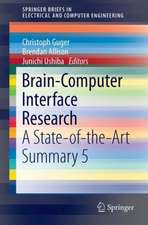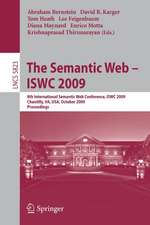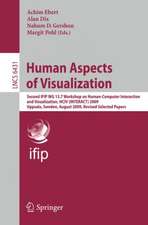Cognition Beyond the Brain: Computation, Interactivity and Human Artifice
Editat de Stephen J. Cowley, Frédéric Vallée-Tourangeauen Limba Engleză Hardback – 5 apr 2017
This new edition continues to demonstrate how a systemic perspective casts a productive light on thinking in applied domains such as crime scene analysis, the use of information technology in construction, and computer-meditated trusts and presents new studies on the cognitive ecology of the web, multi-scalar temporal and organisational cognition and the importance of interactive material engagement in digital architecture. Authors use various scales of the systemic viewpoint to illustrate how bodies and artefacts shape thinking, but in all cases the experience of materiality is meshed with activity that involves the world beyond the body.
Cognition Beyond the Brain is a valuable reference for researchers, practitioners and graduate students within the fields of Computer Science, Psychology, Linguistics and Cognitive Sciences.
| Toate formatele și edițiile | Preț | Express |
|---|---|---|
| Paperback (2) | 645.79 lei 6-8 săpt. | |
| SPRINGER LONDON – 14 iul 2015 | 645.79 lei 6-8 săpt. | |
| Springer International Publishing – 20 iul 2018 | 768.93 lei 38-44 zile | |
| Hardback (2) | 652.07 lei 6-8 săpt. | |
| SPRINGER LONDON – 28 iun 2013 | 652.07 lei 6-8 săpt. | |
| Springer International Publishing – 5 apr 2017 | 788.95 lei 38-44 zile |
Preț: 788.95 lei
Preț vechi: 986.18 lei
-20% Nou
Puncte Express: 1183
Preț estimativ în valută:
151.01€ • 164.09$ • 126.93£
151.01€ • 164.09$ • 126.93£
Carte tipărită la comandă
Livrare economică 18-24 aprilie
Preluare comenzi: 021 569.72.76
Specificații
ISBN-13: 9783319491141
ISBN-10: 3319491148
Pagini: 507
Ilustrații: VIII, 342 p. 44 illus., 28 illus. in color.
Dimensiuni: 155 x 235 x 21 mm
Greutate: 0.79 kg
Ediția:2nd ed. 2017
Editura: Springer International Publishing
Colecția Springer
Locul publicării:Cham, Switzerland
ISBN-10: 3319491148
Pagini: 507
Ilustrații: VIII, 342 p. 44 illus., 28 illus. in color.
Dimensiuni: 155 x 235 x 21 mm
Greutate: 0.79 kg
Ediția:2nd ed. 2017
Editura: Springer International Publishing
Colecția Springer
Locul publicării:Cham, Switzerland
Cuprins
Introduction.- Socially Distributed Cognition in Loosely Coupled Systems.- Distributed Cognition at the Crime Scene.- Thinking with External Representations.- Human Interactivity: Problem-solving, Solution-probing and Verbal Patterns in the Wild.- Linden Ball and Damien Litchfield: Interactivity and Embodied Cues in Problem Solving, Learning and Insight: Further Contributions to a “Theory of Hints.- Cognition beyond the Classical Information Processing Model: Cognitive Interactivity and the Systemic Thinking Model.- Time During Time: Multi-Scalar Temporal Cognition.- Human Agency and the Resources of Reason.- Living as Languaging: Distributed Knowledge in Living Beings.- Cognition in the City.- Computer-mediated Trust in Self-interested Expert Recommendations.- The Cognitive Ecology of the Web.- Material Engagement Theory and Digital Culture.- Organisational Cognition: A Step too Close.
Notă biografică
Stephen J.Cowley is Professor of Organisational Cognition at the University of Southern Denmark. He has developed ways of integrating the study of language, cognition and the sociocultural world and in 2012 he took up his current position in Denmark where he is concerned with how organisations rely on cognitive resources beyond the body. He founded the Distributed Language Group, a community who aims to naturalise language by focusing on how directed, dialogical activity imbues human intelligence with a collective dimension that also makes literacy possible.
Frédéric Vallée-Tourangeau is Professor of Psychology and Director of Postgraduate Research at Kingston University, UK. He holds a BA from McGill University, an MA from the University of Pennsylvania, and a PhD from McGill University. His most recent research explores the role of interactivity in the genesis of insight.
Frédéric Vallée-Tourangeau is Professor of Psychology and Director of Postgraduate Research at Kingston University, UK. He holds a BA from McGill University, an MA from the University of Pennsylvania, and a PhD from McGill University. His most recent research explores the role of interactivity in the genesis of insight.
Textul de pe ultima copertă
This book challenges neurocentrism by advocating a systemic view of cognition based on investigating how action shapes the experience of thinking, placing interactivity at its heart. This systemic viewpoint makes three main claims. First, that many elaborate cognitive skills like language, problem solving and human-computer interaction (HCI) are based in sense-saturated coordination or interactivity. Second, interactivity produces a tightly woven scaffold of resources, some internal to the agent and others external, that elevates and transforms thinking. Third, human agents entwine brains, bodies and their surroundings as they manage multi-scalar dynamics.
This new edition continues to demonstrate how a systemic perspective casts a productive light on thinking in applied domains such as crime scene analysis, the use of information technology in construction, and computer-meditated trusts and presents new studies on the cognitive ecology of the web, multi-scalar temporaland organisational cognition and the importance of interactive material engagement in digital architecture. Authors use various scales of the systemic viewpoint to illustrate how bodies and artefacts shape thinking, but in all cases the experience of materiality is meshed with activity that involves the world beyond the body.
Cognition Beyond the Brain is a valuable reference for researchers, practitioners and graduate students within the fields of Computer Science, Psychology, Linguistics and Cognitive Sciences.
This new edition continues to demonstrate how a systemic perspective casts a productive light on thinking in applied domains such as crime scene analysis, the use of information technology in construction, and computer-meditated trusts and presents new studies on the cognitive ecology of the web, multi-scalar temporaland organisational cognition and the importance of interactive material engagement in digital architecture. Authors use various scales of the systemic viewpoint to illustrate how bodies and artefacts shape thinking, but in all cases the experience of materiality is meshed with activity that involves the world beyond the body.
Cognition Beyond the Brain is a valuable reference for researchers, practitioners and graduate students within the fields of Computer Science, Psychology, Linguistics and Cognitive Sciences.
Caracteristici
Explores the situated and systemic nature of thinking, creativity and decision making Presents interactivity as a key driver of cognition Extends the computational basis of distributed cognition into molecular systems Includes supplementary material: sn.pub/extras
Recenzii
“Cognition Beyond the Brain: Computation,Interactivity, and Human Artifice, a collection of 14 essays, is a finerepresentation of the current state of the field in distributed cognition—notonly for empirical developments but also for disagreements about how to thinkabout distributed cognition. … I highly recommend this collection of essays tophilosophers and psychologists interested in where distributed cognition is,what it could be, and how it can get from one to the other.” (Charles Lassiter,Philosophical Psychology, Vol. 28 (8), 2015)
“Cognition Beyond the Brain is a collection of works that had its beginnings in a 2009 symposium on ‘distributed thinking’ … building upon presentations from this meeting and incorporating later contributions on the subject. … this book is an excellent reference on the topic. … the chapters of this book do a good job of reflecting the diversity of opinion in this area. … In summary, the book is a valuable resource as an overview on distributed cognition.” (Emma Norling, Journal of Artificial Societies and Social Simulation, Vol. 17 (1), 2014)
“It offers a wide range of perspectives on the interaction and interdependencies between the human brain and the environment and context in which it exists. It offers an excellent entry point for readers interested in cognitive studies of thebrain … . Overall, we found the book enjoyable to read, and appreciated the editors’ efforts in assembling a well-balanced set of contributions. It provides insight on how cognition may work, and what influences cognition.” (Franz Kurfess and Kevin Dermody, Computing Reviews, December, 2013)
“Cognition Beyond the Brain is a collection of works that had its beginnings in a 2009 symposium on ‘distributed thinking’ … building upon presentations from this meeting and incorporating later contributions on the subject. … this book is an excellent reference on the topic. … the chapters of this book do a good job of reflecting the diversity of opinion in this area. … In summary, the book is a valuable resource as an overview on distributed cognition.” (Emma Norling, Journal of Artificial Societies and Social Simulation, Vol. 17 (1), 2014)
“It offers a wide range of perspectives on the interaction and interdependencies between the human brain and the environment and context in which it exists. It offers an excellent entry point for readers interested in cognitive studies of thebrain … . Overall, we found the book enjoyable to read, and appreciated the editors’ efforts in assembling a well-balanced set of contributions. It provides insight on how cognition may work, and what influences cognition.” (Franz Kurfess and Kevin Dermody, Computing Reviews, December, 2013)
